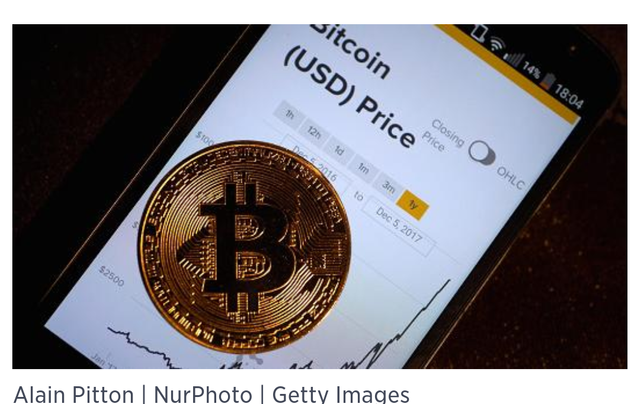MONEY
Reddit user says he owes the IRS $50,000 thanks to bitcoin — here's how to avoid a surprise tax bill
Ali Montag | @Ali_Montag 7 Hours Ago
As bitcoins skyrocket to more than $12 000 for one BTC, many central banks as ECB or US Federal Reserve warn of risks of a bubble.
Alain Pitton | NurPhoto | Getty Images
As bitcoins skyrocket to more than $12 000 for one BTC, many central banks as ECB or US Federal Reserve warn of risks of a bubble.
The rise and fall of bitcoin during recent months has been eye-popping. The digital asset's price shot from below $1,000 at the beginning of 2017 to over $19,000 in December, before plummeting in early 2018 to close at $8,630.65 on Monday, according to CoinMarketCap.com.
But investors who cashed out around the height of the frenzy were left with a big tax bill. Without advance planning, it was an expensive shock to some.
In fact, trading cryptocurrencies reportedly left one Reddit user with a $50,000 debt to the IRS, which he says he's unable to pay.
"I feel like I might have accidentally ruined my life because I didn't know about the taxes," Reddit user Thoway, who says he earns $47,000 a year as an office assistant, posted March 14.
Thoway says he first got involved with cryptocurrency in the beginning of 2017 and bought eight bitcoin for $7,200. By December of last year, says Thoway, that initial investment soared and he decided to cash out.
Since the IRS views cryptocurrency as property — not currency — that sale triggered a "taxable event," leaving Thoway obligated to pay taxes on the appreciation of his investment. The income tax he owes, "adds up to about $50,000 if I add up state (California) and federal," according to the post.
Unfortunately for Thoway, it appears he didn't set aside any money to pay those taxes. In fact, he writes that he then invested his windfall into other cryptocurrencies.
"I got caught up in the alt-coins frenzy," he wrote, referring to alternative digital coins like litecoin or ethereum, "and sold most of my bitcoins (about $120k worth) to buy a bunch of different coins."
Many cryptocurrencies have since fallen sharply, leaving Thoway too broke to pay the tax bill. "I added up my alt-coins and I only have like $30,000 worth. I only have about $5k in other savings," he writes.
Thoway did not respond to CNBC Make It's requests for comment.
Thoway's mistake is an expensive lesson to learn, says Ryan Losi, a certified public accountant and the executive vice president of Virginia based accounting firm Piascik, but not an uncommon one.
"[If] you've come into a large amount of wealth ... by having an asset appreciate that you acquired at a low value, and you think you do not have large tax consequences, you're fooling yourself," he tells CNBC Make It.
That rule applies not just to cryptocurrencies, but any income you make — selling stocks, cashing out of bonds or even selling your house. Generating wealth means you owe the IRS.
But for many inexperienced investors, tax repercussions can be a surprise. Cryptocurrency in particular attracts younger investors, Bloomberg reports, with 58 percent of bitcoin investors falling between the ages of 18 and 34 years old.
"For younger people who don't have taxes top-of-mind, or have never invested before, they're shocked," Cathie Wood, CEO & CIO at ARK Invest tells CNBC. "People had huge gains last year, and they [now] don't have enough in crypto to pay those."
To avoid finding yourself in a position where you can't pay the IRS, Losi has some straightforward advice: If you've seen a large increase in wealth in a calendar year, from cryptocurrency gains or the appreciation of other assets, set a portion of it aside in anticipation of tax payments.
"If your business is doing well, or you sell property or whatever it is — set 30 percent aside of the gross amount of the proceeds," he says.
Put the cash in something liquid like a money market account, says Losi, so that you can easily take it out when you need to pay taxes, but you don't have to worry about it decreasing in value.
"If you do that, you'll never be surprised," he says.
Spending the entirety of your windfall or reinvesting it in something risky can leave you in a lurch come tax time.
"If you don't [put 30 percent aside] and you spend on personal [items] like a house or a car, or if you put it in securities, you've really got only yourself to blame," Losi adds.
Hi! I am a robot. I just upvoted you! I found similar content that readers might be interested in:
https://www.cnbc.com/2018/03/20/how-to-avoid-a-surprise-tax-bill-from-investments-like-bitcoin.html
Downvoting a post can decrease pending rewards and make it less visible. Common reasons:
Submit
Congratulations @drnade! You have completed some achievement on Steemit and have been rewarded with new badge(s) :
Click on any badge to view your own Board of Honor on SteemitBoard.
For more information about SteemitBoard, click here
If you no longer want to receive notifications, reply to this comment with the word
STOPDownvoting a post can decrease pending rewards and make it less visible. Common reasons:
Submit